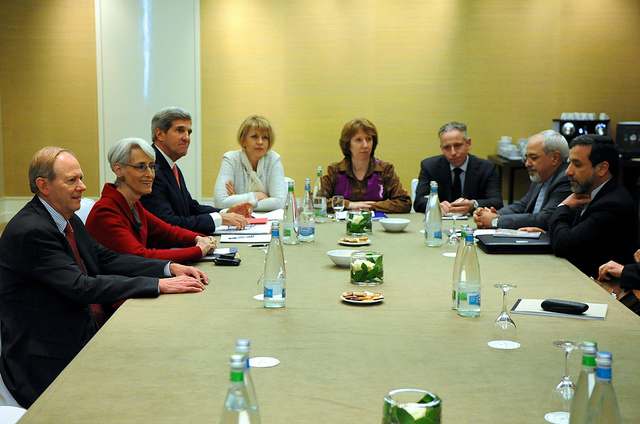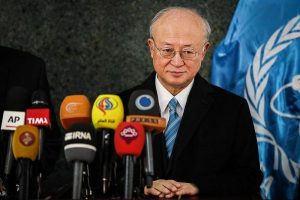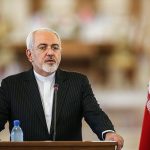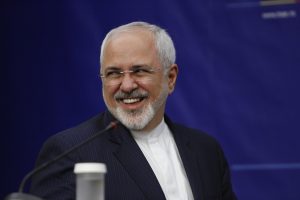by Henry Precht
“Next Steps on Iran.” That was the title of the [seemingly] countless memos that we in the State Department’s Near East Bureau sent to the Secretary and the White House during the chaotic months between the revolution and the hostage crisis in 1979. Our aim was to chart a course that would connect the US with the Khomeini regime and begin in small ways a more normal relationship. We failed. I hope, that the post-Nuclear Deal Iran Desk is working feverishly on a paper suggesting Next Steps towards a country that can be once again be important to the American position in the Middle East.
Unburdened by the bureaucratic need to clear my thoughts with sundry agencies and bureaus, I offer my thoughts on how the Department might occupy itself with Iran in the months ahead.
1. Take a few months’ break from the details of constraining Iran’s nuclear program. Expectations will be high and the initial proposals from either side will be correspondingly unrealistic. Too many eyes — foreign and domestic — will be peering over the shoulders of negotiators; too many knives will be sharpened to plunge if agreement prospers; too many voices will be primed to cry, “I told you so; you can’t trust those snakes!” So, time out. Let’s change the subject for a bit and hope to move on.
2. Instead, the US should encourage the modest signs of good will that have appeared on both sides — actually they’ve been visible among Iranians for decades. That would mean:
- easier access for journalists, academics and selected members of the Congress/Majlis to visit, speak and report home;
- giving the nod to conferences, athletic events and cultural exchanges;
- offering an enlarged number of scholarships for study at the other’s universities;
- engaging each other in discussions of mutual problems, e.g., drug interdiction, climate change;
- encouraging conversations in the private sector about possible future investments, e.g. in oil field management, nuclear plant safety, agriculture — necessarily without commitments as long as sanctions prohibit;
- monitoring rhetoric to phase out or tune down “Death to America” and to resist unnecessary, hurtful adjectives.
3. Involve Iran in seeking solutions to regional problems — Iraq, Afghanistan and, most important, Syria. Try working with Tehran and Riyadh to patch up their relations. Make sure Tehran understands that continued goodwill gestures towards Israel will make life easier for Iran in the US.
4. Over the umpteenth cup of tea, let Rouhani and Co. know that a lighter hand internally would be of high significance over here. Releasing more political prisoners and detainees will pay extra dividends with some in Congress.
5. Share our planned approach with Europeans and enlist them in trying to bring Iran in from the cold.
6. Finally, as relations warm, suggest opening an American consular office for visas and other technical matters in Tehran.
Once this memo is leaked — and it may be before reaching its intended recipient — it should be defended robustly as an effort to nudge Iran towards full and conforming membership in the world community.






Iran has violated its treaty obligations under the NPT by having a secret nuclear program.
Iran was therefore sanctioned under numerous Chapter VII UNSCR’s forbidding it to enrich uranium, engage in any nuclear or ballistic missile activities. Iran continued its explicit violations of both the NPT and of Chapter VII Resolutions by continuing enrichment, including to 20%, building centrifuges, building ballistic missiles, experimenting with nuclear weaponisation, experimenting with nuclear triggers, nuclear implosion devices, high speed cameras, miniaturization of nuclear warheads, and building the Arak heavy water reactor as well as starting the Buscher reactor. Under the “peace deal”, Iran retains virtually its entire nuclear weapons program, including the right to enrich uranium, and all of its experiments on nuclear weaponisation as well as the right to construct additional parts of the Arak heavy water reactor off site. It is inconceivable that this totalitarian terror regime with openly genocidal intents would give up a nuclear weapons program that it has been building for decades. This nuclear deal gives international legitimacy to a terror regime which even today fights alongside Assad’s forces and murders innocent civilians, including young children. The idea of setting up this vile repulsive regime as a balance of power in the region is worse than irrational-it is immoral.
I have to ask you again, just where do you get your facts from? You sprout much, yet never back it up when asked too. So, I presume it’s a safe bet to say you take your information from the same people who write Netanyahoos outbursts. The more I read here in this LobeLog, the more I get a picture that if rapprochement occurs and Iran takes its seat in a Peaceful, productive manner, the M.E. will be better off, especially in the export of both forms of energy. Considering the known reserves, the worlds thirst, it’s beginning to sound like Israel is afraid to compete in the market, unless it’s at the end of a barrel, (with the eastern Mediterranean basin being taunted as a bonanza in Gas & Oil, which Israel wants to control. And, considering the past & present behavior that Israel has shown toward the Palestinians and the settlements/Gaza, then it’s possibly a crap shoot that Israel would even play fair. One last item, your rhetoric concerning Iran’s behavior, fits more closely to Israels, IMHO.